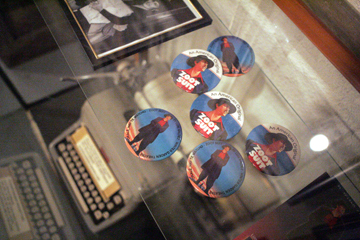
Latest presentation of SJB show extended through Sept. 30
A bit of California history, mixed with fact and fiction, is
taking the stage at El Teatro Campesino’s Playhouse in San Juan
Bautista. The tale of the sleepy lagoon murder trial and the 1940s
Zoot suit riots has graced stages around the world, including
broadway theaters in New York, but now its back for an extended run
in the Mission city.
Latest presentation of SJB show extended through Sept. 30
A bit of California history, mixed with fact and fiction, is taking the stage at El Teatro Campesino’s Playhouse in San Juan Bautista. The tale of the sleepy lagoon murder trial and the 1940s Zoot suit riots has graced stages around the world, including broadway theaters in New York, but now its back for an extended run in the Mission city.
Many younger audiences have only had the chance to see the show on the small screen – and while Edward James Olmos and Daniel Valdez are amazing as the leads of “El Pachuco” and Henry/Hank Reyna – “Zoot Suit” is a show that must be seen live to truly experience it.
In the 1970s, Luis Valdez wrote “Zoot Suit” as a fictional work that mixed in some of the facts from the Sleepy Lagoon trial and the 1940s zoot suit riots in Los Angeles. In reality, the 1942-43 trial was the largest mass trial in California’s history – with 17 young Mexican-American boys arrested for the murder of one man. Five others were charged with assault. But it is something that isn’t typically taught in history classes.
The latest incarnation of “Zoot Suit” is produced by Phil Esparza and Marilyn Abad-Cardinalli, long-time board members with El Teatro Campesino. Kinan Valdez, Luis’ son, directs the play. The cast includes some actors with lifelong experience and others who are just starting their careers – but the talent pool largely comes from the San Benito region.
The story focuses on Henry Reyna (Adrian Torres) – the character based on the real-life Henry Leyvas – who is about to give up his flashy clothes for a Navy uniform as the United States becomes more embroiled in WWII. Instead, during a last night on the town, Reyna gets involved in a local turf war with a rival gang. As he gathers his boys for revenge, a ranch hand ends up dead.
Reyna’s counter part in the movie is “El Pachuco (Michael Uribes).” Pachuco is a slang word that stands for the zoot suit style of dress, the attitude and the language. The play is mostly in English with a smattering of Spanish and what the scholars have referred to as “Calo” or a dialect distinctive to the Pachuco culture. The play program provides a translation for the audience of the most commonly used words, such as carnal/carnalito, which means brother or little brother; ese, which means bro or dude; and ruca, which means girlfriend.
In the play, El Pachuco, dressed sharply in a black zoot suit, with a bright red shirt and a fedora, represents a mixture of Reyna’s roots and his soul, but also serves as an antagonist. When his fellow inmates – all men Reyna grew up with – start to toe the line and take the advice of Alice Bloomfield (Alika Spencer) while work starts on the appeal after all the men are convicted, El Pachuco keeps Reyna from giving in.
While El Teatro Campesino gets back to its roots on the stage, the theater troupe continues to look to the future. At a recent Saturday matinee, board member Esparza announced that the theater company has discussed fund-raising for a 500-seat theater to be opened for their 50th anniversary in seven years. He pointed out other improvements around the current theater.
“Those of you who have visited us before will notice we paved our parking lot,” Esparza said. “It only took us 30 years.”
Those interested in learning more about the history of El Teatro and its literature also have the chance to enroll in a Gavilan College online course for Fall 2007. The three-unit class is taught through the theatre arts and television program. For more information, call 408-848-4764 or visit www.gavilan.edu.
For patrons of the arts who prefer just to enjoy the shows, “Zoot Suit” will continue through Sept. 30. A Dia de Los Muertos program will run Nov. 1-4 and their winter show “La Pastorela” will open Nov. 23.
El Teatro Campesino has extended the run of “Zoot Suit,” directed by Kinan Valdez through Sept. 30.
Showings are Thursday, Friday and Saturday at 8 p.m. and Saturday and Sunday matinees at 2 p.m. Priority seating is $30, adult seating is $25, Seniors/Students are $22 and children 12 and under are $18.
For more information, call 623-2444 or visit www.elteatrocampesino.com.








